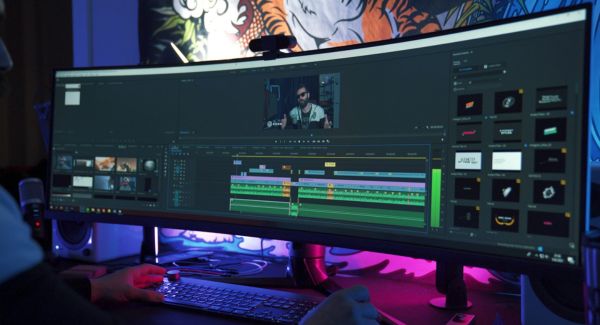Why Delivery Starts in Development and Shapes Your Film’s Success
by Carole Dean
For many indie filmmakers, the thrill of writing, casting, and shooting takes center stage, while the post-production phase is often an afterthought. Yet, those who’ve completed the journey from script to screen know that this is where the real magic happens—and where the real challenges begin.
In post-production, your film isn’t just edited together; it’s shaped, polished, and transformed. It’s also the stage where hidden pitfalls—technical issues, legal hurdles, and budget surprises—can either propel your project to success or grind it to a halt. This phase, often underestimated, is where the future of your film is decided.
Recently, I had the pleasure of sitting down on my The Art of Film Funding Podcast with Brynn Lucas, an award-winning producer with expertise in post-production supervision, delivery, and creating compelling Electronic Press Kits (EPKs). Brynn’s track record spans working with major studios like Warner Bros., Universal, and Paramount, as well as streaming giants like Netflix, Hulu, and Apple.
In this interview, Brynn shared valuable insights about how indie filmmakers can navigate the complexities of post-production successfully. Her advice is practical and deeply rooted in her years of experience.
As Brynn says, “Delivery starts in development.” This key principle echoes throughout her approach to filmmaking, and it’s something every filmmaker should understand from the outset.
Here are the key questions I asked and Brynn’s answers that will help guide indie filmmakers to have a smooth and successful post production experience.
The Importance of Budgeting and Early Planning
Indie filmmakers often overlook or under-budget for post-production, a critical error that can create substantial financial and logistical headaches later on.
Carole: What are the primary challenges filmmakers face when preparing for delivery?
Brynn: Budgeting is a significant challenge. Many filmmakers, especially those fresh out of film school, underestimate costs because they’re accustomed to using free resources and student labor. In the real world, every piece of equipment and every professional service costs money.
Many filmmakers also fail to contract post-production teams through the entire delivery process. This mistake often leaves them scrambling when they need key documents or edits after the main post-production phase.
Why Post-Production Planning Should Begin in Pre-Production

Brynn’s mantra, “Delivery starts in development,” is crucial to successfully finishing your film. Post-production is not a separate entity but rather an integral part of the filmmaking process that should be considered from day one. Understanding the entire flow—from production to final delivery—will not only save you time and money but also allow you to anticipate potential roadblocks.
By having your editor, sound designer, and VFX team in place during pre-production, you can catch potential issues before they become bigger problems. For example, your editor can suggest the shots and coverage you’ll need to ensure smooth storytelling, while a sound designer can advise on capturing high-quality audio during filming. Without this early input, you might discover issues like poor sound, missing footage, or difficult-to-fix lighting problems only after shooting wraps—leading to expensive reshoots or workarounds.
Involving your post team early also helps create an efficient workflow for managing and processing footage. This ensures smooth transitions through editing, sound mixing, and color grading without technical setbacks.
While your post team doesn’t need to be on set full-time, regular check-ins during production allow them to catch any problems early. Having a post-production team in place from the start saves time, money, and ensures your film is delivered at its best quality.
Understanding the Delivery Process: Legal and Technical Aspects
A film isn’t complete when you yell “cut” on the last day of shooting. The delivery phase is equally, if not more, complex. There are two main types of delivery that every filmmaker must understand: legal and technical.
Carole: You mentioned two types of delivery—legal and technical. Could you explain what each entails?
Brynn: Absolutely. Legal delivery involves all documentation: contracts, rights agreements, and clearances. Without these, you can’t secure distribution. Filmmakers must ensure that every location, song, and actor is covered by a legal agreement. Missing documents can stall or prevent distribution entirely.
Technical delivery is about the film’s physical and digital assets, like the master file and audio-visual components. The most critical part of this process is the QC (Quality Control) check, where the film is scrutinized for technical errors such as drop frames, pixelation, or audio mismatches. It’s vital to have your post team on standby to address these issues promptly.
The importance of a thorough QC process cannot be overstated. Brynn made it clear that having a good post-production team in place is essential for catching these issues before they cause bigger problems down the line.
The Role of the Post-Production Supervisor
Many filmmakers assume they can handle post-production on their own or with minimal support. According to Brynn, this is a recipe for disaster.
Carole: It sounds like a post-production supervisor is crucial from the beginning.
Brynn: Yes, they are. A good supervisor ensures that the team understands post-production requirements and that nothing is left out. As I say, “Hire someone who speaks post.” They manage the complex language and specific needs of post-production. Without a post supervisor, filmmakers can quickly become overwhelmed by the technical jargon and requirements they’re unfamiliar with.
Having a post-production supervisor from the very start will save you from countless missteps. This person is your guide through the labyrinth of post-production—ensuring that everything from editing to final delivery runs smoothly.
Navigating the QC Process
One of the more intimidating aspects of post-production is Quality Control (QC), where your film is put under a microscope—literally.
Carole: For those new to this, could you elaborate on what QC involves?
Brynn: QC begins with a print master, the native version of your film, which is sent to a quality control house. They go through the film frame by frame, checking for technical errors and categorizing them by severity. You aim to fix anything level three or higher, though you review all issues initially.
Brynn emphasized that knowing specific QC phrases can help you defend creative choices. “Best source” refers to the highest quality version of a shot or asset, and “creative intent” can be used to argue that certain visual elements, like lens flares, are deliberate and shouldn’t be flagged as errors.
Understanding how to navigate the QC process can save both time and money. A good post-production team, paired with clear communication with your QC provider, is essential to getting through this phase without unnecessary delays.
Budgeting for Post-Production and Technical Needs
Filmmakers often underestimate the costs associated with post-production, and this can lead to financial strain or even prevent the completion of a project.
Carole: You mentioned that filmmakers should budget for post-production early. Can you expand on this?
Brynn: Yes, it’s about anticipating costs from the start. Assume that every time an editor plugs in your hard drive, there will be a charge. Plan for this in your budget to avoid unexpected expenses. Editors, colorists, sound engineers—they all charge by the hour or by the service. Every revision and adjustment comes at a cost, so plan accordingly.
She also stressed that filmmakers should not forget to budget for QC-related expenses and other technical requirements like color correction, mastering, and creating the deliverables required by distributors.
Deliverables: Understanding Sales and Distribution Requirements
One of the most complex aspects of post-production is preparing the deliverables required by sales agents and distributors. These are the materials needed to market, sell, and distribute your film.
Carole: How do you handle different types of sales and distribution deals?
Brynn: First, determine if deliverables come from a sales agent or a distributor. Sales agents often work on general elements for mass sales, while distributors provide specific delivery schedules.
Brynn highlighted that each type of deal—whether it’s for a theatrical release, VOD, or an SVOD deal—will have unique requirements. Filmmakers must understand what’s expected, confirm it, and ensure all materials are prepared and budgeted for accordingly.
Deliverables can range from simple electronic press kits (EPKs) to more complex materials like international versioning and subtitles. Understanding these requirements from the outset will save you from unnecessary stress and additional costs down the line.
Chain of Title and Legal Documentation
Legal documentation is often a daunting aspect for filmmakers, but it is a necessary one.
Carole: Let’s talk about legal documents. What should filmmakers be prepared to deliver?
Brynn: Filmmakers need a comprehensive chain of title, covering every aspect from script development to final production. This includes all rights agreements, location releases, and proof of payment for services. Everything must be documented to protect against legal challenges.
Brynn couldn’t emphasize enough how crucial it is to have these documents in order from the very beginning. Many filmmakers make the mistake of thinking they can deal with legal paperwork later, only to find that they’ve lost critical distribution deals because of missing documents.
“This is why I emphasize that delivery starts in development,” Brynn reminded us again. Preparing legal documentation early on ensures that your film can move forward without unnecessary legal hurdles.
Lessons Learned and Final Advice
Throughout the interview, Brynn’s advice was filled with actionable insights and hard-earned wisdom. Her final takeaway for filmmakers was both practical and encouraging.
Carole: What’s your key advice for filmmakers navigating post-production?
Brynn: Don’t pretend to know everything. Ask questions, learn from those who’ve done it before, and hire professionals when needed. Mistakes in post-production are often costly, but proper planning and hiring the right people can mitigate many of these risks.
Her parting words serve as a reminder that while indie filmmakers are often resourceful, there is no substitute for experience and expertise in the post-production process.
Ensuring a Smooth Delivery
Post-production can be an overwhelming process for indie filmmakers, but with early planning, a solid budget, and the right team, it doesn’t have to be. As Brynn Lucas shared, understanding the intricacies of post-production—from QC to legal documentation—will not only ensure a smoother delivery but also protect your film’s success in distribution.
“Delivery starts in development,” Brynn says, and it’s advice worth heeding. By preparing early, budgeting properly, and surrounding yourself with professionals who understand post-production, you set the stage for a successful, polished final product that is ready to take on the world.
Thank you to Brynn Lucas for her invaluable insights, and we hope these tips will guide indie filmmakers through the challenging but rewarding journey of post-production.
Carole Dean is president and founder of From the Heart Productions; a 501(c)3 non- profit that offers the Roy W. Dean Film Grants and fiscal sponsorship for independent filmmakers.
profit that offers the Roy W. Dean Film Grants and fiscal sponsorship for independent filmmakers.
She is creator and instructor of Learn Producing: The Ultimate Course for Indie Film Production. Essential classes for indie filmmakers on how to produce their films.
She hosts the weekly podcast, The Art of Film Funding, interviewing those involved in all aspects of indie film production. She is also the author of The Art of Film Funding, 2nd Edition: Alternative Financing Concepts. See IMDB for producing credits


